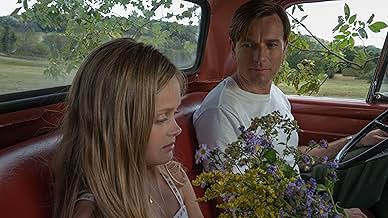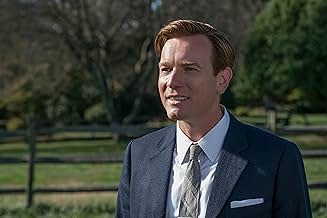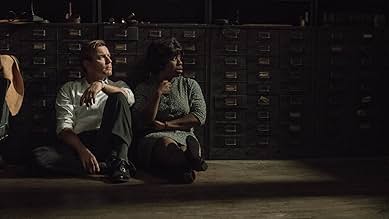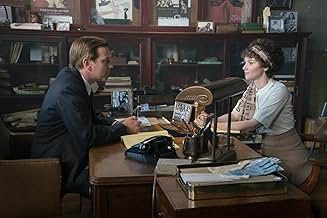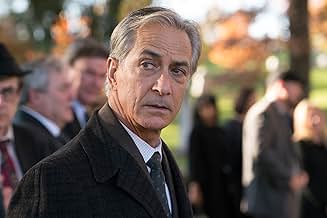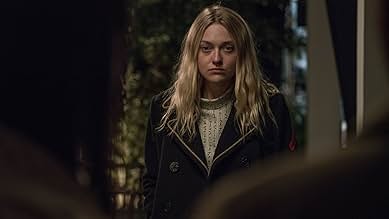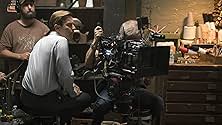American Pastoral
- 2016
- Tous publics
- 1h 48m
An All-American college star and his beauty queen wife watch their seemingly perfect life fall apart as their daughter joins the turmoil of '60s America.An All-American college star and his beauty queen wife watch their seemingly perfect life fall apart as their daughter joins the turmoil of '60s America.An All-American college star and his beauty queen wife watch their seemingly perfect life fall apart as their daughter joins the turmoil of '60s America.
- Awards
- 1 win & 3 nominations total
- Merry (8 Years Old)
- (as Ocean Nalu James)
- Director
- Writers
- All cast & crew
- Production, box office & more at IMDbPro
Featured reviews
The script is by John Romano, based on the 1997 novel of the same name by Philip Roth, who based his main character on a real person – with some embellishments. And what a character Roth created! The Swede seemed to have it all! He was a star high school athlete (really, a hero and a legend in his hometown), he married a beauty queen (a former Miss New Jersey), he took over his father's thriving business (manufacturing high-end ladies' gloves), he had a house with land (in a very pastoral setting), he and his wife had a loving, beautiful daughter to care for. What could be bad? All of it. At the 45th high school reunion of Swede's older brother, Jerry (Rupert Evans), he tells Swede's story to an old classmate, Nathan Zuckerman (Oscar nominee David Strathairn), a journalist who was overseas during the 1960s.
Seymour "Swede" Levov (Golden Globe nominee Ewan McGregor) was the pride of the Jewish-American community in Newark (which nicknamed him "Swede" because of his Nordic good looks), but Swede's life became difficult after high school – and went downhill from there. Swede had to struggle to get his very traditional father (Oscar nominee Peter Riegert) to accept the Catholicism of his wife, Dawn (Oscar winner Jennifer Connelly), he struggled to keep his business viable in the face of declining customer demand (and being at the epicenter of the 1967 Newark race riots), and he struggled mightily with his daughter, Merry (played by Ocean James in Merry's childhood and by Dakota Fanning as a rebellious teenager). Merry dealt with a bad stutter, which clearly affected her confidence and self-esteem (besides the "problem" of having such a beautiful mother, as pointed out by Merry's psychologist, played by Molly Parker). But Merry's problems (and her parents' problems with Merry) had just begun.
As she grew up, Merry became disillusioned with the world which she saw on TV as seemingly coming apart. She strongly sympathized with the Civil Rights Movement (especially its more radical elements) and the Vietnam anti-war movement (especially its more radical elements as well). She went from spewing hatred at President Johnson's image on the family's TV set to regularly taking the train into New York to commiserate with like-minded radicals. She rudely rebelled against all authority figures (including her own loving parents) and started talking openly about the need for a revolution in the U.S. One day, a local post office exploded, killing one man, and Merry disappeared. Her anguished parents insisted that Merry couldn't have done such a thing unless she was brainwashed and forced by others.
Over time, the movie's characters display very different reactions to the post office bombing. The police and FBI are convinced that Merry did it and they follow the few leads that they have trying to find her. Dawn doesn't want to believe that her daughter committed this horrible act, but gradually accepts it, leading her to a nervous breakdown. Jerry tries to get his brother to deal with the probability that Merry is guilty. Swede, however, never gives up on his daughter. He'll never believe in Merry's guilt unless he hears a confession from her own lips. Either way, all he wants to do is bring his daughter home and he never stops looking for her. The unexpected appearance of a mysterious young woman named Rita Cohen (Valorie Curry), who says she knows Merry, ends with Swede more desperate and frustrated than ever – and putting increased stress on his relationship with Dawn. Regardless, Swede never ever quits.
"American Pastoral" is a unique combination of enlightening, frustrating, inspiring and depressing. I gained a greater understanding of what was going on during the Vietnam Era, how certain social issues intertwined and how all of this affected ordinary people. I was frustrated by the daughter's behavior – and by the way the movie glossed over any real explanation for her unlikely and extreme radicalization. I was inspired by Swede's determination and unconditional love for his daughter but it was depressing to see what those admirable qualities did to his previously promising life. The story's somewhat shaky, but interesting, the direction of McGregor (directing his first feature) is mostly solid, the characters are compelling and this impressive ensemble of actors are all at the top of their games. This movie won't leave you feeling very pastoral, but it will teach you more about America – and the power of love. "B"
The main issue, is that while Dakota Fanning is a talented actor, the screenplay writing of her part in the film really fails.
In the novel she is a psychopath murdering innocent people in involved with people who think Stalin was a good guy. She is literally the equivalent of a neo-Nazi terrorist but on the extreme left. The film just doesn't delve into that and fails completely as a result. Some of the commentary on this review section shows that people who have not read the novel completely misunderstand this film, given the source material is about the destruction the daughter wreaks on her family and others.
Skip the film and give the novel a read.
Seymour "Swede" Levov (Ewan McGregor) and his wife Dawn (Jennifer Connelly) live an idyllic existence in the 1960s in the United States, until the maturity of the couple's daughter, Meredith "Merry" Levov (Dakota Fanning), who will bear the sign of tragedy for the family. Philip Roth does nothing to build the foundations for the disaster: Merry is sexually attracted to her own father, Swede suffers constant pressure because of the racial and social unrest that plagues the surroundings of her glove company, and Dawn, from a woman who knows exactly what he wants, he becomes less faithful to his family. When Merry (Dakota Fanning) begins to suffer social problems in the school and academic environment, it is hell for the Levov family, as a childhood stutter to get her father's attention at the expense of her mother, her thirst for attention reaches political activism. Extremists. In fact, she participates in local terrorist acts, with lethal results, which will affect her family forever.
The novel on which "American Pastoral" was based won the Pulitzer - the "Oscar" of journalism - and the script for a film about the book had been shooting in Hollywood since 2006. Paul Bettany was cast as Swede, Jennifer Connelly as his wife and the couple's daughter would be actress Evan Rachel Wood, when the film adaptation project of the book began in 2004. But over the years, only Jennifer Connelly remained in American Pastoral. The film had its world premiere on September 9, 2016, at the 2016 Toronto International Film Festival, and was released in theaters in the United States on October 21, 2016 by Lionsgate.
The first half feels like McGregor tried to transpose a Douglas Sirk film - a saccharine mid-century suburban reverie with just the right amount of family conflict simmering beneath the surface - into a darker, almost David Fincheresque tone. But whereas Sirk was limited by the strict censors of his day, unable to emphasize the illicit and complex themes of infidelity, sexual misconduct, and classism that were buried in the subtext of his work, McGregor seems to face the reverse problem. He is liberal in showing sexuality, violence and psychological trauma on screen, but he is not very clear about what lies beneath the surface. Having never read Roth's novel, I can't speak to how well the film may have translated the work, thus being forced to judge it on its own merits. But I think I can safely say that the first half of his film is sorely lacking the kind of thematic subtext included in the literature, one that could propel the narrative more gracefully into its tumultuous second and third acts.
The only transparent thematic statement in the opening of "American Pastoral" is explicit, clichéd and a little disappointing - it comes when Seymour "Swede" Levov (McGregor) and his wife Dawn (Jennifer Connelly) are meeting with their daughter Merry's therapist. (Dakota Fanning), Dr. Smith. The psychologist (Molly Parker, from House of Cards) talks incessantly about Merry's apparent Electra complex, and the film immediately jumps to a camping trip with Swede and Merry (12 years old - played by Hannah Nordberg), where Merry essentially tries seduce your father. The camping scene is skillful, disturbing, and well-acted - and would have worked well enough on its own to establish the motivations behind Merry's character. But it's spoiled by the earlier inclusion of blatant exposition in the therapist's office. There are hints of other themes; the evils of perfectionism, the false burden of patriarchy, the misconceptions of fatherhood, etc... but aside from some much-appreciated critiques of the male-dominant nuclear family, these themes are kind of vague and nebulous, floating aimlessly in the background of the screen.
The scene in the therapist's office may serve as a paradigm for the flaws of "American Pastoral." It shines when McGregor allows the audience to connect with the narrative through the strong performances, or simply revel in the absolutely stunning image on screen. But when the film overloads itself with excessive thematization, or simply loudly states its premise in voice-over narration, it feels woefully unimpressive. David Strathairn plays Nathan Zuckerman, a friend of Swede's younger brother, and serves as our secondary source throughout the film. Swede's brother tells Zuckerman the whole story at his 45th high school reunion, turning the film into a framed tale told by two unreliable narrators. At least we don't see much of them, as the film moves away from its narration after the opening scene. However, whenever Strathairn intercedes, especially at the end of the film, he ruins the entire subtext - his narration is overly literal, painfully wordy (a trait explained by Zuckerman reminding us that he is "the famous writer" yawn), and totally unnecessary.
Roth's book is a little more complex than most accounts will tell you. After the first few chapters, in which Zuckerman relates what he personally knows about The Swede and the events of his life, the remainder of the book consists of material that Zuckerman admits to inventing about the man and his story. It's a form of metanarrative, and it goes a long way toward making sense of characters who actually make little sense in a realistic narrative. One such character is Rita Cohen, a young radical who comes into contact with The Swede after Merry runs away and tortures the decent man with radical rhetoric and vehement sexual games. Rita makes sense as a projection of Zuckerman: as a "real" character in this tragedy, she doesn't, but that doesn't stop Romano and McGregor from presenting her as such. (Valorie Curry, who plays the role, struggles to make her believable). When Rita appears, the fake notes begin to overwhelm the real ones. Like an argument between The Swede and Merry about politics, underscored by Buffalo Springfield's "For What It's Worth," a song that has now lost all meaning as a 60s beacon or anything else. Likewise, the film downplays the father-daughter relationship, playing out their verbal exchanges and signaling Merry's rebellion by having her play Jefferson Airplane records too loudly in her room. Romano's script gives Dawn's character more weight, but turns her into something of a hateful harpy in the process. People who accept the contemporary caricature of Roth as a misogynist may not believe it, but the book's portrayal of Dawn is both more sympathetic and more empathetic to her resentment of having been a beauty queen.
Screenwriter John Romano has the job of adapting this work, and "American Pastoral" is a novel that would need a radical makeover to work as a feature film (a short miniseries could have been interesting), but Romano plays it safe, albeit selectively. Its fidelity to the source material is suffocating, the script mimicking the form of Roth's text while abandoning its flow.
There are some strong scenes. The heated arguments between the Swede and his daughter before her disappearance are the closest the film comes to capturing the irreconcilable generational disagreements of half a century ago, with Ms. Fanning's icy tone of moral superiority echoing the extreme left-wing rhetoric of era. But the Vietnam War is just a footnote in a film so condensed that it resorts to the soundtrack's most tired cliché: Buffalo Springfield's "For What It's Worth" to evoke countercultural dissent. The main story line traces Swede's desperate search for Merry. When he is close to giving up hope, he is visited by Rita Cohen (Valorie Curry), a mysterious and sinister go-between for her daughter's revolutionary cell, who taunts him with the hope of seeing Merry, and then humiliates him by playing the temptress. Sadist. Their interactions momentarily set the film on fire.
Much of the book's power lies in Nathan's bitter retrospective dissections of the Swede. But without these complicated reflections, the film's intellectual substance is stripped away, leaving only bones, gristle, and a few fragments. Swede comes to life as a hurt father, but not as an idealist whose foundations of belief are shaken to the core. As the film gallops along at a pace that compresses most plot details into a scant 108 minutes, no time is allowed for the dark reflections that give the novel a tragic-comic dimension. It doesn't help that "American Pastoral" was filmed in Pittsburgh. The pedestrian cinematography and editing give it the look and feel of a bland television movie.
In the inadequate depiction of the riots that devastated Newark in the late 1960s, the violence was reduced to angry skirmishes in the streets. Archival footage of the actual riots barely scratches the surface of the events. "American Pastoral" is a film that raises awareness regarding the upbringing of our children as well as attention to the family, where a slight lack of care can generate catastrophic consequences. And it hurts your heart.
Philip Roth's superb book has passages of language that crystallizes our thinking, our memories, our association with life. In this cinematic transformation the words are placed in the utterances by Nathan Zuckerman, sort of an Everyman as he states in the opening of the film – 'Let's remember the energy. America had won the war. The depression was over. Sacrifice was over. The upsurge of life was contagious. We celebrated a moment of collective inebriation that we would never know again. Nothing like it in all the years that followed from our childhood until tonight, the 45th reunion of our high school class 30 or 40, a gathering of my old classmates would have been exactly the kind of thing I'd have kept my nose out of. But at 62, I found myself drawn to it as if in the crowd of half-remembered faces I'd be closer to the mystery at the heart of things, a magic trick that turned time past into time present'. John Romano adapted Roth's novel American PASTORAL for the screen. Ethan McGregor directs. We all reflect on a time that somehow, though placed in the 1960's resistance against the Vietnam War, is terrifyingly familiar with the mood of the nation at present, again at resistance rallies – and that is the reason it works so well.
Seymour 'Swede' Levov (Ewan McGregor) was from the Jewish community and is an All- American sports star in high school. He had everything an American idol can dream of - a the tall muscular young man and high school star athlete but he married a Catholic beauty queen named Dawn (Jennifer Connelly) against his father's (Peter Riegert) advice. Swede later became the successful manager of the glove factory his father had founded, which allowed him to live with his wife in a beautiful house in the New Jersey countryside. Well-mannered, always bright, smiling and positive, conservative but with a liberal edge, what bad could ever happen to him? The couple's stuttering daughter Merry (Hannah Nordberg then Dakota Fanning) is their pride and joy until she steps into the 1960s and becomes an antiwar activist, responsible for bombing a little station, killing the owner in what is a senseless and horrifying change in life direction. Merry leaves home and the rest of the film is a father's search for peace with his distraught wife and community while he ceaselessly searches for his renegade daughter.
A difficult film to watch, just as the book was challenging to read. But somehow the mirror it holds up to society as we are currently living it makes the disturbing experience all the more poignant.
Did you know
- TriviaPaul Bettany was cast as Swede, Jennifer Connelly as his wife and Evan Rachel Wood as their daughter. All dropped out in 2004, after the movie spent many years in development. After 10 years, Connelly returned in the lead role, alongside Ewan McGregor.
- GoofsThe newspaper's masthead identifies 1970 as it's "141th Year." Should have been "141st Year."
- Quotes
[last lines]
Nathan Zuckerman: [narrating funeral] You come at people with an open mind, and yet you never fail to get them wrong. You get them wrong while you're with them, or you tell someone about them and get them wrong again. That's how we know we're alive. We are wrong. About the Swede, how life was going to open its arms and shower blessings upon him, I was never more wrong about anyone in my life.
- SoundtracksComes A-Long A-Love
Written by Al Sherman
Performed by Kay Starr
Courtesy of Capitol Records, LLC
under license from Universal Music Enterprises
- How long is American Pastoral?Powered by Alexa
Details
- Release date
- Countries of origin
- Official sites
- Languages
- Also known as
- El fin del sueño americano
- Filming locations
- Production companies
- See more company credits at IMDbPro
Box office
- Gross US & Canada
- $544,098
- Opening weekend US & Canada
- $149,038
- Oct 23, 2016
- Gross worldwide
- $2,063,436
- Runtime1 hour 48 minutes
- Color
- Sound mix
- Aspect ratio
- 2.35 : 1
Contribute to this page








